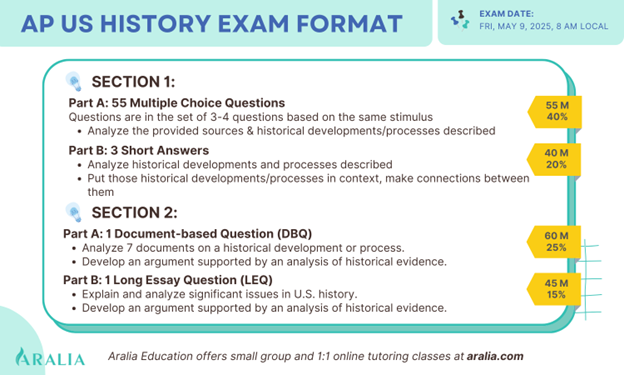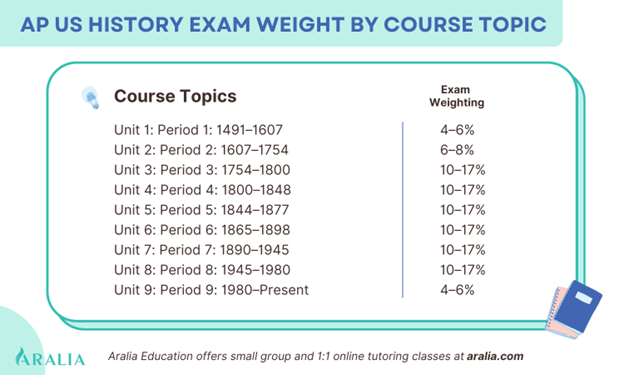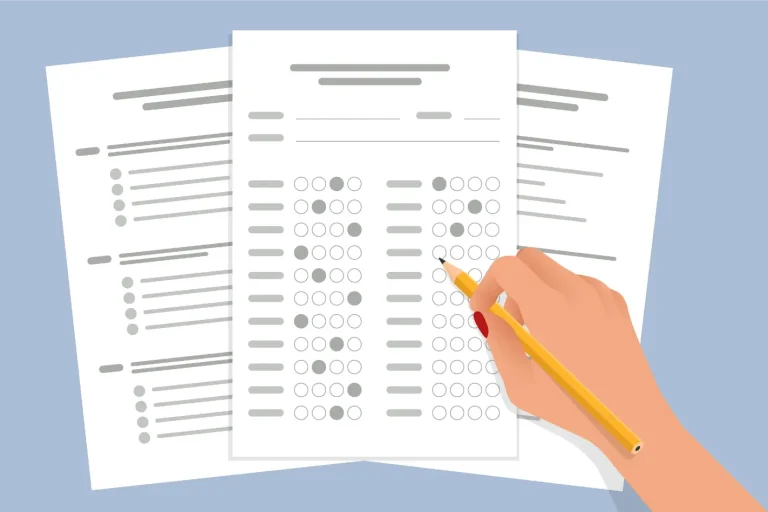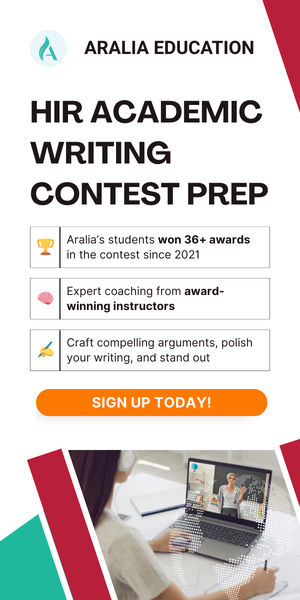Improve Your AP Grades Within One Semester
AP US History Exam Content and Structure
Before diving into the detailed study guide for APUSH, it’s important to familiarize yourself with the exam’s overall content and structure. Understanding which historical periods will be covered and their corresponding weight will help you plan your study approach more effectively. For a comprehensive overview of the APUSH curriculum and exam format, you can refer to the College Board AP US History course and exam description document. Additionally, you can explore our article comparing APUSH and AP World history for more helpful insights.
1. History concept outline
The AP U.S. History (APUSH) exam, as outlined by the College Board, spans American history from approximately 1491 to the present. The curriculum is divided into nine chronological periods:
- 1491-1607: Native American societies and early European contact.
- 1607-1754: The establishment of colonies by Spain, France, the Netherlands, and England in the New World.
- 1754-1800: The American Revolution and the formation of the United States, including the development of early republican institutions.
- 1800-1848: The rise of democracy and westward expansion.
- 1844-1877: The Civil War and Reconstruction.
- 1865-1898: Industrialization and the Gilded Age.
- 1890-1945: Social and cultural changes in the U.S. and the causes and effects of global wars and the Great Depression.
- 1945-1980: Post-war America and the Civil Rights movement.
- 1980-present: Contemporary America.
These nine periods serve as a roadmap for organizing your study materials. By focusing on the key events and themes from each period, you can ensure that you cover all the essential topics and avoid missing critical information in your preparation.
2. Historical thinking skills & reasoning process
In addition to providing a comprehensive understanding of U.S. history, the APUSH course focuses on developing students’ historical thinking and reasoning skills. The exam assesses five key skills:
- Analyzing historical evidence and sources
- Making historical connections
- Chronological reasoning
- Creating and supporting arguments
- Historical interpretation and synthesis
These skills are reflected in the exam format, which includes a variety of question types designed to test both your knowledge of U.S. history and your ability to apply critical historical thinking techniques developed throughout the course.
3. Exam format and weighting
The AP U.S. History exam is divided into two main sections, with four key parts. Below is a table outlining the time allocated and the weight of each section.

Comprehensive Study Guide
1. When and how should I start studying for the AP US History exam?
Since history can be challenging for many students, it’s important to begin preparing for the AP U.S. History exam as early as possible. Ideally, you should start studying 3-4 months before the exam date. For example, if you plan to take the exam in May 2025, it’s best to begin preparing now, or at the latest, by February. However, for the best results, staying engaged with the course material throughout the school year, including during class discussions and after each test, will make your final study sessions easier and less stressful.
Start by taking a pre-test or reviewing the scores from any exams you’ve already completed in your AP U.S. History course. This will help you identify your strengths and areas where you may need more review. Additionally, familiarize yourself with the weight of each historical period covered in the exam (see the table below). Understanding which periods carry more weight on the test will help you prioritize your study efforts.

This information will help you develop a study plan focusing on the periods and topics that need attention. Focus more on the periods you are less familiar with and allocate additional time to study the periods weighted more heavily in the exam. This strategic approach will allow you to manage your time effectively and maximize your study outcomes.
2. Develop a study plan
Once you have a clear understanding of the periods and topics that need more focus, you can begin organizing your time around the material you need to review. To help guide your planning, refer to this study checklist from Trevor Packer, Senior VP of Advanced Placement at the College Board. A solid study plan should include:
- Weekly reviews: Dedicate a specific time each week to go over your notes and textbooks.
- Topic breakdown: Focus on one historical period or theme per study session to avoid feeling overwhelmed.
- Practice testing: Incorporate practice quizzes and sample questions into your routine on a weekly basis.
To ensure you’re staying on track and making progress, it’s important to assess your study plan regularly. Every two weeks, or at least once a month, take time to review your progress and make adjustments as needed. Certain topics require more time than you initially anticipated, so continual reflection and updating of your plan will help you stay focused and ensure that you cover all necessary material.
3. Tips for Effective Study
To make your study sessions more effective, consider these tips based on your strengths, weaknesses, and learning preferences:
- If you’re struggling with dates and details: Try using tables or mind maps to organize key information. Visual aids can make it easier to remember specific dates and events. Flash cards can also be helpful for memorizing specific dates.
- If you are having difficulty understanding the big picture or themes, switch up your study approach. Watch recorded lecture videos from the College Board, historical documentaries, or YouTube crash courses, or read books and infographics about the period to better understand.
- Create summaries: After reviewing each period, summarize the key events, individuals, and themes to reinforce your comprehension and retention.
- Group study: Join or form a study group where you can discuss important concepts, quiz each other, and share different perspectives. This can be particularly helpful for memorizing events, dates, and significant themes.
- Seek help when needed: If you struggle with a specific topic or concept, don’t hesitate to ask for support. Ask your teacher, friends, or tutor for clarification—they may have a different approach that makes things click.
By tailoring your study methods to your individual needs, you can boost your understanding and retention, making your preparation for the APUSH exam more efficient and effective.
Enroll in Aralia’s AP US History Preparation Courses
Guide to Effective Practice Test Strategy
After you finish studying all the course content and materials, it is time for you to do practice tests.
1. How to prepare for multiple choice & short answer questions?
Multiple Choice: These questions often test your ability to recall specific details, but they also require you to apply knowledge. Practice with sample questions to familiarize yourself with the format and types of questions.
- Tip: Focus on understanding broad themes rather than memorizing specific facts.
- Tip: Read all the answer choices before selecting the best one, as there can be tricky distractors.
Short Answer: For these questions, you’ll need to provide clear, concise responses. Practice by answering questions under time constraints. Aim to write 3-4 sentences per response.
- Tip: Focus on being specific and relevant in your answers. Stick to the question and avoid unnecessary information.
- Tip: Incorporate specific examples or evidence to support your argument.
2. How to prepare for the DBQ (document-based question)?
The DBQ requires you to analyze historical documents and use them to craft a well-supported argument. To excel in this section, it’s crucial to make the most of your 15-minute reading period. A successful analysis of the documents will help you outline your ideas and structure your response more easily. If critical reading is a challenge for you, practice analyzing different types of documents and take notes while you read to improve both your analytical skills and reading speed.
Here are some tips to help you tackle the DBQ:
- Develop a Thesis: Your thesis should directly answer the question and incorporate evidence from the documents to support your argument.
- Organize Your Essay: Structure your essay clearly: start with an introduction (including your thesis), followed by body paragraphs that each focus on a specific document or theme, and conclude with a strong closing statement.
- Time Management: Use the 15-minute reading period to take focused notes on each document, paying attention to the author, purpose, and point of view. This will guide your analysis and help you organize your thoughts effectively.
3. How to prepare for the LEQ (long essay question)?
The LEQ tests your ability to write a coherent, well-supported argument within a limited timeframe. You’ll have 45 minutes to analyze the prompt, develop an outline, and write the full essay, so time management is key. Familiarize yourself with past exam questions to identify common themes and prompts, which will help you quickly understand the focus of the question on exam day.
If you don’t usually use an outline when writing essays, start practicing with one. A strong outline ensures that you cover all your points and stay on track throughout your essay. Be sure to support your arguments with specific evidence to strengthen your essay.
Mastering the LEQ question requires consistent practice. However, effective practice involves more than just repetition—it requires feedback and recommendations after each essay. However, seeking regular feedback can be challenging for students. Fortunately, there are resources available, such as websites and apps, that offer instant feedback on your LEQ responses. One well-known platform is Albert.io, which provides College Board-level practice tests along with comprehensive answer keys that offer valuable insights. Another affordable option is Knowt, a web app that generates AI-powered AP practice questions and grading, helping students identify areas of weakness and better prepare for AP exams.
For more tips on preparing and practicing for the LEQ, check out the exam tips document provided by the College Board.
4. APUSH practice exam and scoring guide
Now that you have a solid understanding of each question type on the APUSH exam, it’s time to start practicing. You can prepare for each exam section individually or take the full practice exam in one sitting. However, we recommend that if you opt to work on each section separately, you should still take the entire exam from start to finish a few times before the test day. This will help you become accustomed to the time constraints and the focus required for the more than 3-hour exam.
While calculating your score after each practice test is valuable for tracking your progress, try not to let the numbers discourage you. Scores are a tool to help you identify areas where you need to dedicate more study time or specific skills that need improvement. Use this feedback to adjust your study plan for greater effectiveness. If scoring causes stress, consider seeking feedback from friends, family, tutors, or teachers on your free-response writing instead, to help you refine your skills.
Below are some free practice exams and APUSH score calculator resources to help with your preparation:
- Full practice exam:
College Board’s APUSH Practice Exam – Effective 2017
College Board’s APUSH Practice Exam – Effective 2016
- Free response questions from past exams:
College Board’s APUSH Free-response Questions from 2015-2024
- APUSH score calculator:
5. Tips for practicing
Timed Practice: Simulate real exam conditions by practicing with timed multiple-choice questions and essay writing. This will help you build test-taking stamina and improve your time management.
Review Mistakes: After practicing, review the questions you missed and analyze why you chose the wrong answers. This will help you solidify your knowledge and avoid similar mistakes in the future.
Use Rubrics and Scoring Guides to Improve Essays: For DBQs and long essays LEQs, review the rubrics used by the College Board to grade these responses. Understanding the expectations for each essay type will help you focus on key elements like thesis development, argument support, and the use of evidence.
By incorporating these strategies into your practice sessions, you’ll be better prepared for the AP U.S. History exam and improve your overall performance.
Prepare for APUSH with Aralia’s Award-winning Teachers
Aralia Education offers specialized courses for students aiming to excel in the AP U.S. History exam. Designed to boost historical knowledge, analytical skills, and exam readiness, these courses are taught by experienced instructors who provide personalized instruction and a tailored curriculum. With the support of Aralia’s expert teachers, students gain the tools and resources necessary to succeed in this challenging course and exam!

In AP United States History (APUSH), students will review key content concepts and course objectives through answering long essay questions (LEQs), document-based question essays (DBQs), and short answer questions (SAQs). Furthermore, students will practice using historical thinking skills by answering multiple-choice questions and providing written responses.











